Sudan timeline January-March 2024: Sudan becomes ‘the largest humanitarian crisis in the world’
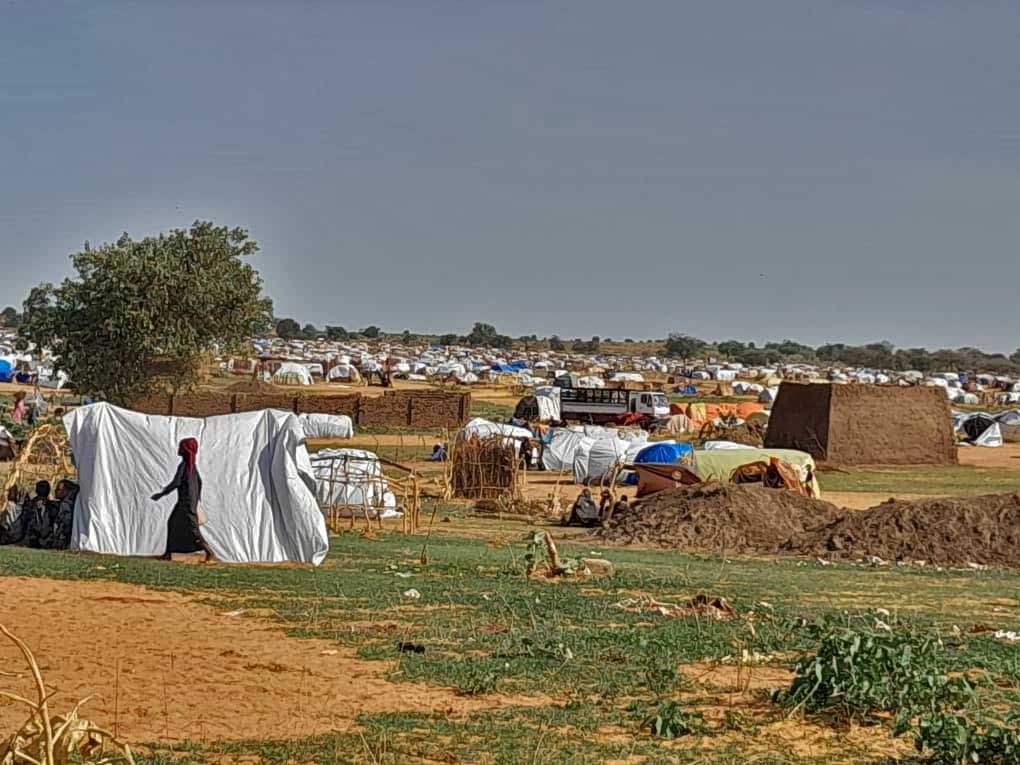
Darfuri refugees in Adré in eastern Chad (Photo: Bashir Adam / RD)
Humanitarian conditions are rapidly deteriorating across Sudan, in particular in the war zones, as most people have depleted their reserves. International organisations warn that ‘every second person’ in Sudan needs aid. Washington calls Sudan ‘the largest humanitarian crisis in the world’. The Sudanese Armed Forces (SAF) intensifies its offensive against the paramilitary Rapid Support Forces (RSF) in Khartoum state, North Kordofan, and North Darfur, and books successes in Omdurman. The airstrikes on RSF sites in the country lead to many more civilian casualties. An almost nation-wide communications and Internet blackout blocks the receival of remittances and other funds for at least six weeks. The USA and EU impose sanctions on Sudanese Islamists and companies linked with the SAF and RSF. The Sudanese Civil Democratic Forces alliance (Tagadom) continues its diplomatic efforts to realise a lasting peace in the country. After a tour of the region, Tom Perriello, the newly appointed US Special Envoy to Sudan says ‘he hopes’ that talks between the SAF and the RSF will resume in April.
January: Fierce fighting continues in Khartoum state and West Kordofan. The Civil Democratic Forces alliance (Tagadom), which invited SAF Commander Abdelfattah El Burhan and RSF Commander Mohamed ‘Hemedti’ Dagalo for talks about the future of Sudan, signs a Declaration of Principles with Hemedti in Addis Ababa. The International Organisation for Migration (IOM) warns that the humanitarian response is insufficient for the victims of ‘the world’s largest displacement crisis’. People are starving in Darfur and Khartoum state. Diseases like cholera, dengue fever, and measles are spreading. Sudan freezes its membership of the Horn of Africa Intergovernmental Authority on Development (IGAD).
January 1: US Secretary of State Anthony Blinken urges the Sudanese Armed Forces (SAF) and the RSF to end their ‘senseless war’. Layers and journalists say that the ‘January 1’ speeches by El Burhan and Hemedti ‘deny reality’. Banks in White Nile state have allegedly transferred all cash to Port Sudan, capital of Red Sea state.
January 2: RSF Commander Hemedti signs a Declaration of Principles with the Tagadom civil alliance, chaired by former PM Abdalla Hamdok, in the Ethiopian capital. ‘Intense airstrikes’ on RSF sites are reported from Khartoum, El Gezira, and Sennar. A Beja leader warns that the situation in eastern Sudan has become ‘extremely fragile’.
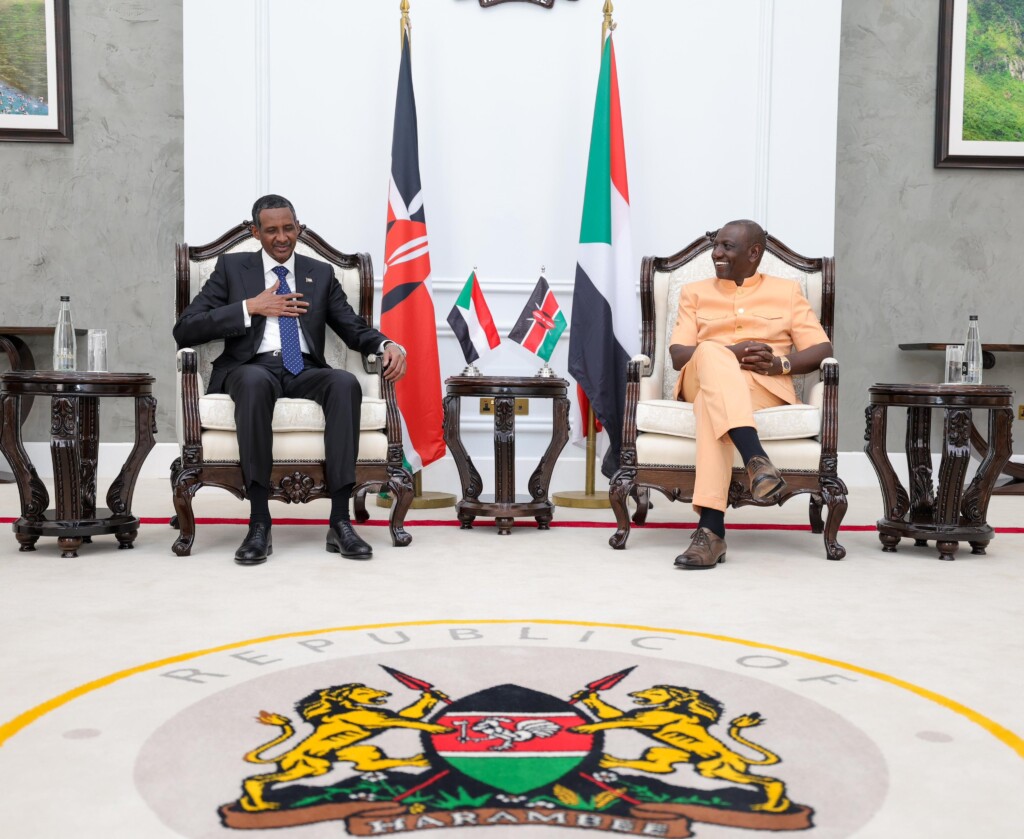
January 3: Battles continue in Khartoum state. In Darfur, food and shelter have become unavailable to many. Hemedti meets with Kenyan President William Ruto as part of his Africa tour. His signing of the Declaration of Principles with Tagadom has elicited diverse responses from political stakeholders.
January 4: The situation in Sudan tops the 2024 Emergency Watchlist of the US International Rescue Committee. The de facto government in Port Sudan summons the Kenyan ambassador about Hemedti’s reception while the RSF commander is visiting South Africa. Six activists are released in eastern Sudan amidst continuing military detentions.
January 5: El Burhan repeats that the army will only enter talks with the RSF after the militia has ‘retreated from urban areas’. Hemedti visits Rwanda. The Catholic Church in Sudan and South Sudan expresses concern about the protracted fighting in Sudan.
January 6: At least 11 die in ongoing airstrikes on Khartoum and Wad Madani. Fighters of the Sudan People’s Liberation Movement-North led by Abdelaziz El Hilu (SPLM-N El Hilu) repel an RSF attack on Delling in South Kordofan. People in Omdurman are dying of thirst and hunger.
January 7: Fuel shortages threaten the sorghum harvest in White Nile state.
January 8: Fierce battles continue to rage in Khartoum state. In Wad Madani, capital of El Gezira, Sudanese Air Force bombings kill several people. The Famine Early Warning Systems Network (FEWS NET) reports that the lean season may start atypically early in most areas of Sudan.
January 9: All three cities of Khartoum state witness violent RSF-SAF clashes. Médecins Sans Frontières’ (MSF) reports about the ’ethnic violence’ in Darfur. The Eastern Sudan Civil Forces Alliance renews its call on both warring parties to keep the East a safe haven. International Crisis Group urges high-level diplomatic effort ‘to keep Sudan from further collapse’. The Tagadom alliance seeks to build the ‘broadest democratic civil front possible’.
January 10: Water and fuel scarcity affects large parts of Sudan. Hospitals in El Obeid, capital of North Kordofan, report a lack of oxygen supplies amidst electricity and water shortages. Two people are killed by barrel bombs in the South Darfur capital Nyala. The SAF says it warded off a new RSF attack on Delling.
January 11: Intense airstrikes on Khartoum continue as army troops advance in Omdurman. At least 13 are killed in SAF-RSF fighting in southern Khartoum. Civilians in eastern Sudan join popular resistance groups ‘despite their hate of Islamists’. Sennar reports an increase in cholera cases.
January 13: The SAF has reportedly reinforced El Faw in western El Gedaref. Rumours about an RSF attack on Babanousa in West Kordofan again prompts people to flee the town. Sudan’s Communist Party turns down an invitation of Tagadom to join political talks.
January 14: Fuel supply woes leave most parts of Sudan ‘running on empty’.
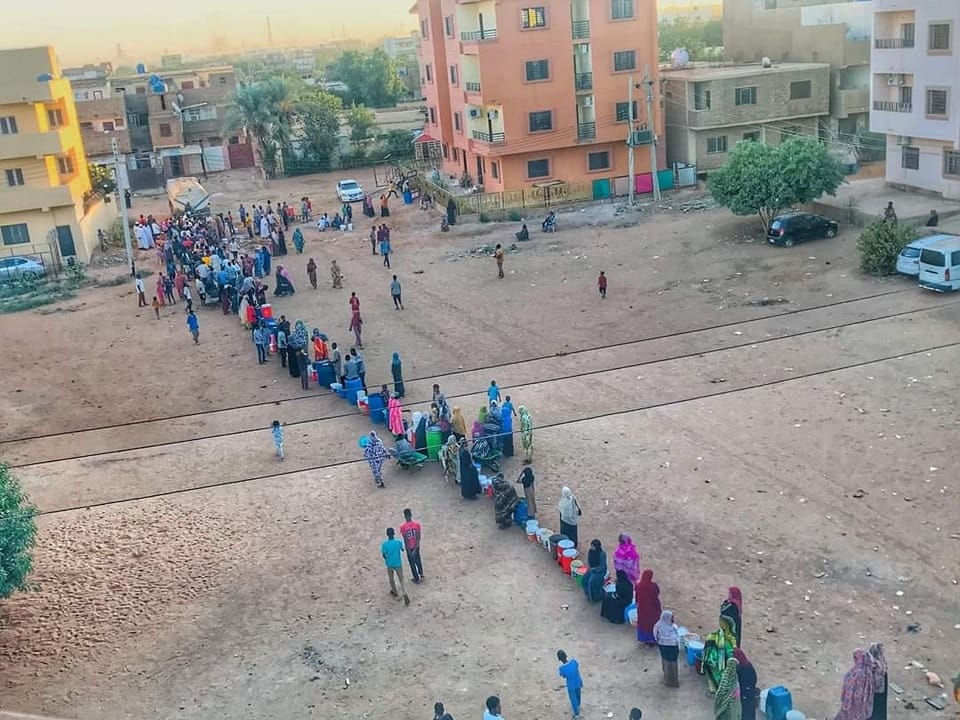
January 15: Both SAF and RSF detain politicians in Omdurman. Northern Sudan is bracing for an RSF invasion. Sudanese die while illegally crossing the border into Egypt.
January 16: Sudan suspends communication with IGAD after the organisation received Hemedti at its summit. South Sudan tightens its control of the border with Sudan.
January 17: An airstrike on El Zurug, North Darfur, which is under RSF control, kills 12 people. Fighting continues in Khartoum state. The AU Commission forms a High-Level Panel on the Resolution of the Conflict in Sudan. The UN expert on human rights in Sudan deplores the ‘grim situation’ in the country. The Combating Violence against Women and Children Unit of the Sudanese Ministry of Social Affairs reports ‘at least’ two new cases of sexual violence in El Gezira.
January 18: Darfuri children starve to death in the Iridimi refugee camp in eastern Chad. The Sudan Air Force launches airstrikes on El Geneina and Nyala. Fighting continues in Khartoum. Tagadom chair Hamdok and RSF commander Hemedti attend the opening of IGAD’s 42nd Extraordinary Summit in Uganda. The UN Fact-Finding Mission on Sudan begins its investigations.
January 19: RSF detains the editor-in-chief of El Midan.
January 20: The Sudanese de facto government freezes its IGAD membership.
January 21: The UN Office for the Coordination of Humanitarian Affairs (OCHA) reports that 7.6 million people fled their homes since April 15 last year. The Sudanese Journalists Network (SJN) denounces the targeting of journalists by Military Intelligence and the RSF.
January 22: Fierce fighting persists in greater Khartoum, prices of fuel and food soar. Five civilians are killed in RSF-SAF battles near Babanousa in West Kordofan. RSF troops assault and abduct people in El Gezira. The EU takes restrictive measures against six Sudanese companies.
January 23: The UN Panel of Experts reports on ‘the worst violence in Darfur since 2005’. A Sudanese economist says that the government raised the US Dollar customs rate ‘to finance the war’. The leader of the mainstream Sudan Liberation Movement (SLM-AW), Abdelwahid Nur, meets with the Kenyan president. Sudan’s Arab Socialist Ba’ath Party says that a party member was tortured to death in military detention. Workers at Red Sea ports warn of a ‘shipping paralysis’ because of tensions in the Bab El Mandeb strait.
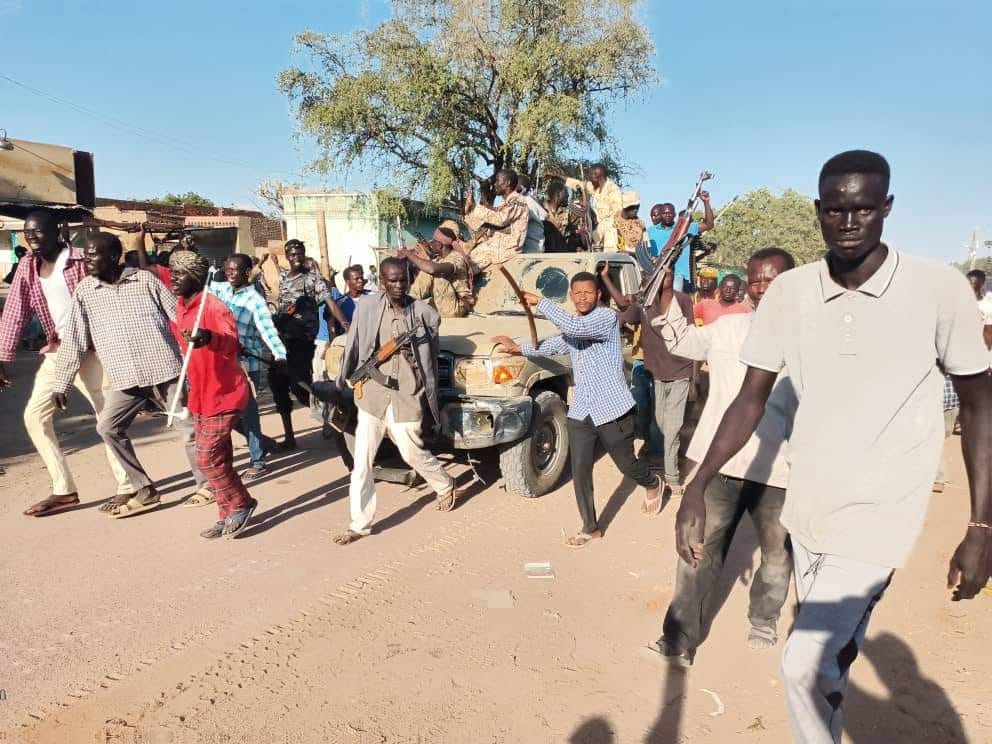
January 24: The RSF attack the army garrison in Babanousa as fighting continues in Khartoum and El Fasher, capital of North Darfur.
January 25: The armament of ‘popular resistance’ groups in eastern Sudan and the establishment of training camps in Eritrea raise fears for violence in the region. Clashes continue in greater Khartoum, while the RSF takes control of large parts of Babanousa. RSF paramilitaries detain a journalist and a politician in El Gezira. The Tagadom alliance continues its efforts to meet with the army leader to talk about peace.
January 26: International organisations warn that ‘every second person’ in Sudan is in need of humanitarian aid. The Darfur Bar Association (DBA) is investigating the involvement of the United Arab Emirates (UAE) and the Russian military Wagner Group into the armed conflict in the country.
January 27: Battles continue in Khartoum state, while relative calm is reported from Babanousa. More than 50 people die in tribal clashes in Abyei, West Kordofan.
January 28: The FA ministers of Egypt and Saudi Arabia call for an immediate ceasefire in Sudan, while El Burhan visits Algeria. The RSF allegedly down an Iranian-made drone in Omdurman. The Communist Party and the SLM-AW agree ‘to confront the challenges facing the fate of the country’.
January 29: ICC Prosecutor Karim Khan describes the situation in Sudan as ‘dire by any metric’. El Gedaref in eastern Sudan deports forces affiliated with the Sudan Liberation Movement faction led by Minni Minawi (SLM-MM) following frictions with members of another SLM group in the state. Hemedti denounces El Burhan’s ‘impulsive’ Sudan-IGAD split.
January 30: Kyiv Post says that the Ukrainian Special Forces recently conducted three drone attacks targeting ‘Russian mercenaries’ and their ‘local terrorist partners’ in Sudan. USA offers a reward for the capture of Ahmed Harun, indicted by the ICC in The Hague. The Islamic Movement in Sudan condemns the move. North Kordofan reports an increase in cholera and dengue fever patients. The Darfur Network for Human Rights seeks justice for a victim of RSF torture.
January 31: Hundreds of unaccompanied Darfuri children face harsh living conditions in Chad refugee camps. The rate of the Sudanese Pound continues to decline as the majority of the country’s industries has been destroyed. The US Office of Foreign Assets Control imposes sanctions on three companies that jeopardise ‘Sudan’s peace, security, and stability’.
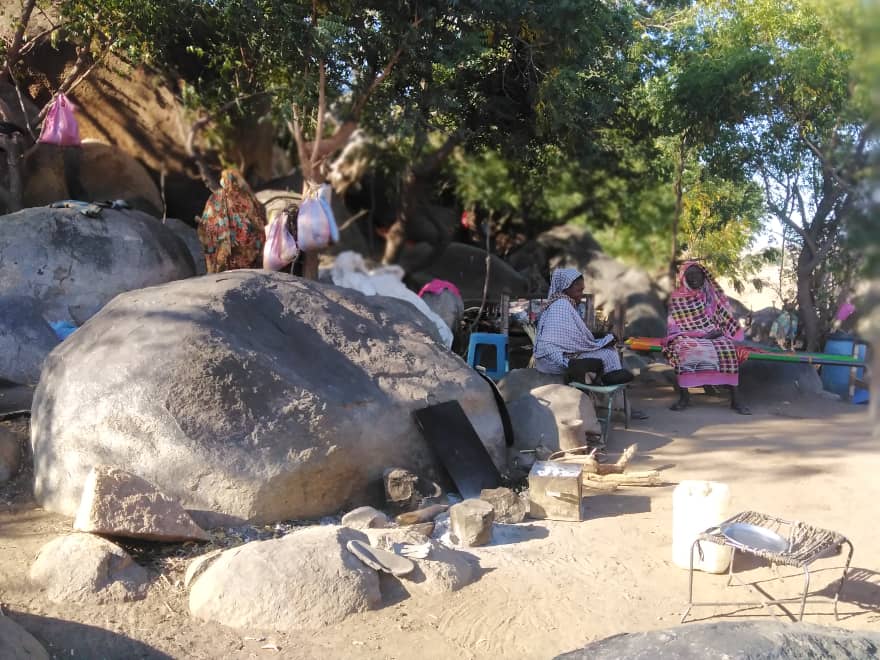
February: Reports of people, in particular children, starving to death in Darfur camps are increasing. Efforts continue to transport aid from Port Sudan to Darfur. People in South Kordofan and Khartoum state are also facing ‘extreme hunger’. Organisations warn of ‘an imminent famine’. The USA calls Sudan ‘the largest humanitarian crisis in the world’. The country faces a total telecommunications and Internet blackout. The Sudanese de facto government and Iran restore relations. The army continues to gain ground in Omdurman. SAF and RSF battles also persist in Kordofan and North Darfur. RSF groups in El Gezira are attacking villages, turning ‘life into hell’. The Tagadom alliance continues to lobby for a peaceful solution to the violent conflict. El Burhan travels to Algeria, Libya, and Egypt. Hemedti visits Libya.
February 1: Child mortality rates surge in the South Darfur displacement camps. Renewed SAF-RSF battles are reported from El Fasher. A former Sudanese Minister of Water Resources warns about the Blue Nile’s ‘perilously low levels’.
February 3: Sudani and MTN communication and internet providers witness interruptions in El Gezira, Sennar, and large parts of eastern Sudan. RSF paramilitaries are reportedly ravaging villages in El Gezira. The government in Port Sudan denounces the US sanctions on Zadna International Company.
February 4: The SAF continue to gain ground in Omdurman. Nearly two-thirds of Sudan are unreachable as the communications blackout widens. The Famine Early Warning Systems Network (FEWS NET) warns that the continued battles are worsening the ‘already severe’ food insecurity in Sudan. South Sudan’s president takes the lead for ‘an all-inclusive inter-Sudanese dialogue’.
February 5: Médecins Sans Frontières (MSF) reports that one child is dying every two hours in the large Zamzam camp for displaced people in North Darfur. Iran welcomes Sudan’s request to restore bilateral relations. The RSF denies being behind the communication blackout.
February 6: More than 3.5 million people in areas controlled by the SPLM-N El Hilu in the Nuba Mountains and Blue Nile region face ‘extreme hunger’. Displaced in South Darfur say they are ‘terrorised by RSF-affiliated gunmen’. Telecommunications and Internet witness a ‘total blackout’ in the country.
February 7: The UN emergency relief coordinator announces that SAF and RSF agreed to meet in Geneva to discuss humanitarian access in Sudan.
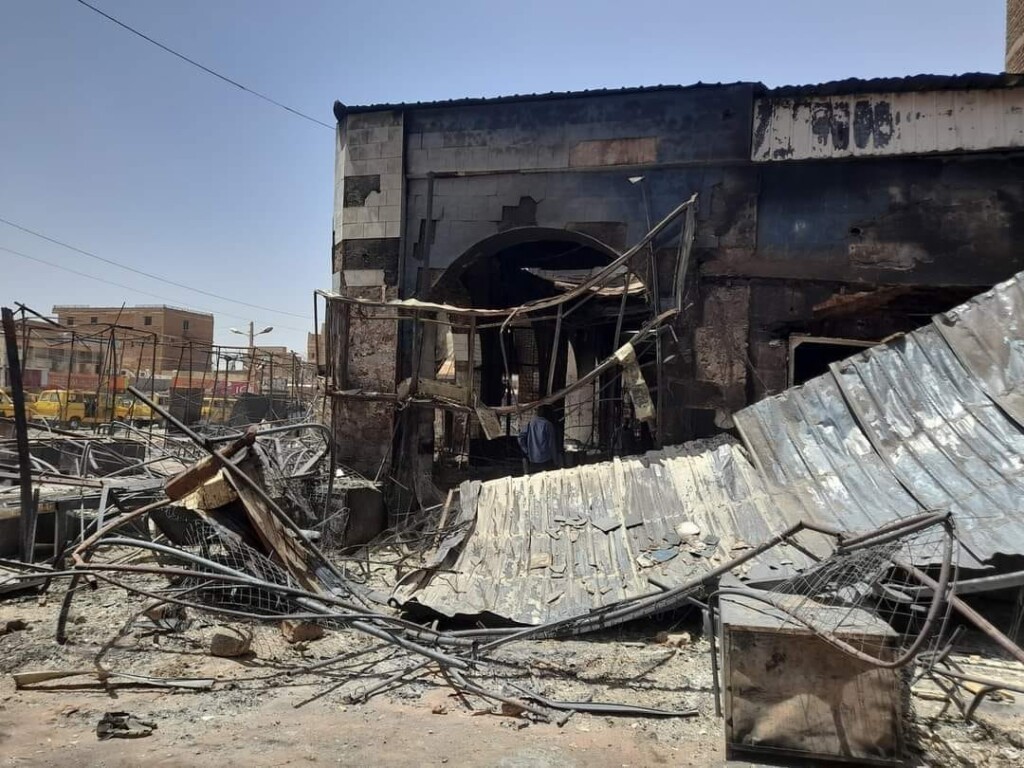
February 8: RSF Commander Hemedti laments the human suffering in Sudan. Efforts continue to transport aid from Port Sudan to Darfur. People in El Fula, capital of West Kordofan, continue to flee their homes for fear of an RSF attack on the city. The communication outages have prompted a proliferation of Starlink satellite receivers across the country. A delegation of the Forces for Freedom and Change-Democratic Bloc (FFC-DB) visits Juba.
February 10: Renewed SAF-RSF clashes in and around the North Darfur capital cause the displaced of El Salam camp to flee once again. Thousands of people flee Habila in South Kordofan following an attack by SPLM-N El Hilu affiliates. The Sudanese Journalists Syndicate (SJS) fears that the fighting near the National Radio and Television Corporation in Omdurman may destroy the nearly 100-year-old archives. The Sudanese Congress Party expects that SAF-RSF talks in Geneva will fail.
February 11: The Clingendael Strategic Monitor predicts ‘catastrophic hunger levels’ in mid-2024. The El Geneina Resistance Committees corroborate ‘alarming findings’ from an unpublished UNSC Panel of Experts report on Darfur. Environmental activists in Talodi, South Kordofan, report a surge in mining operations using toxic chemicals.
February 12: The South Sudanese president discusses the FFC-DB meeting outcomes with Minni Minawi.
February 13: A delegation of Tagadom meets with the US Assistant Secretary of State on African Affairs in Addis Ababa.
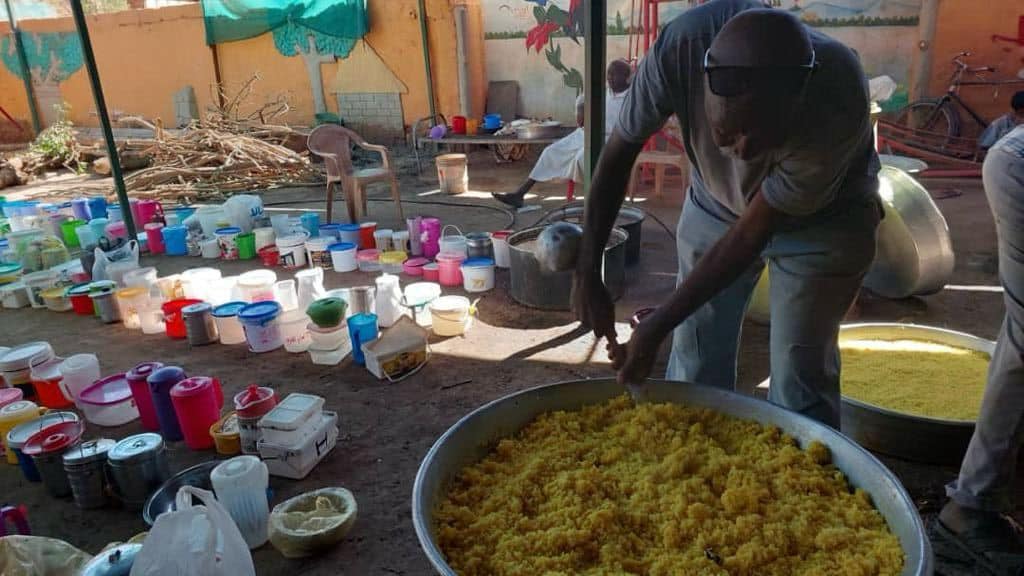
February 13: Radio stations in Darfur reel from the damage caused by the ongoing war. Russia reportedly ‘shelves plans’ for a naval base at the Red Sea in Sudan.
February 14: The Zain and MTN communication networks continue to be cut off throughout the country. Nuba are facing health problems as toxic gold mining operations expanded in South Kordofan during the war. The Sharia Supervisory Board for Financial Institutions issues a fatwa regarding deposits in force majeure circumstances.
February 15: As the Sudan conflict hits its 300-day mark, a ‘military solution’ seems far from feasible. OCHA reports a ‘staggering scale of suffering’ in the country. The 37th annual AU summit, about to start, does not have the war in Sudan on its agenda.
February 16: Sudanese refugees in South Sudan camps face dire hardship.
February 17: Sudanese and African civil society organisations meeting in Addis Ababa during the AU summit urge the union to send a military force to Sudan.
February 18: Pope Francis calls for a halt to the war in Sudan. A Sudanese legal expert says that the warring parties’ hindering access to aid constitutes a crime against humanity. The Tagadom alliance spearheads the diplomatic drive at the AU summit. The internet outages are causing a severe cash crisis in the country. Zain Sudan says the company’s services have been cut by the RSF.
February 19: The communications blackout causes food kitchens to halt in Khartoum while people are starving to death. Kadugli in South Kordofan is witnessing a severe scarcity of sorghum. Sudanese in Ethiopian refugee camps are prone to attacks by bandits.
February 20: More than 10 civilians die in airstrikes on neighbourhoods in the East Darfur capital. Tagadom chair Hamdok tells Radio Dabanga about the alliance’s founding conference and its efforts to meet with El Burhan.
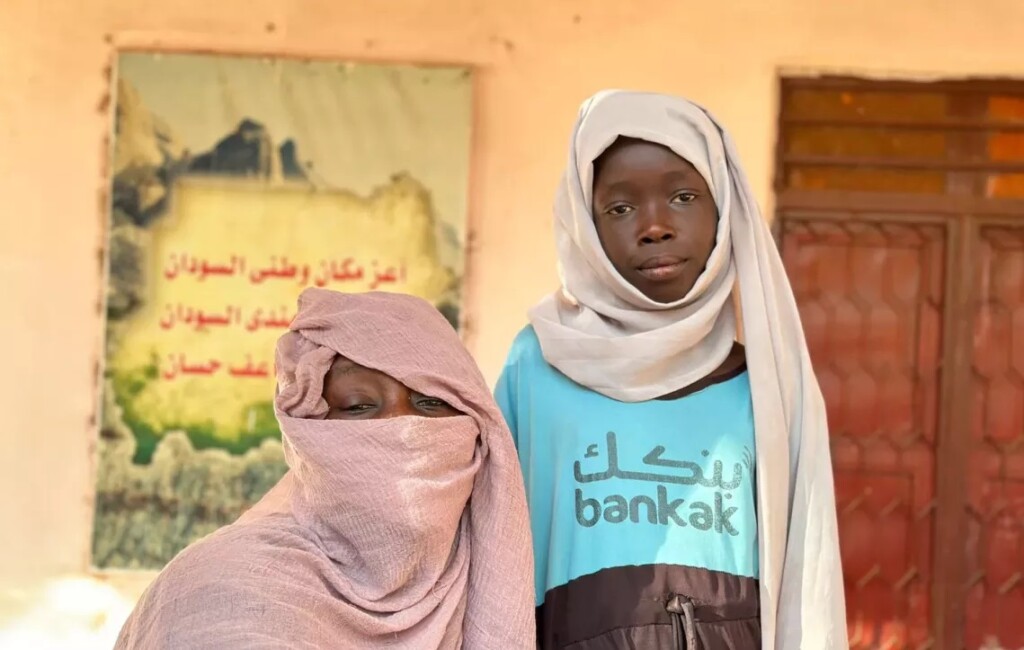
February 21: The World Food Programme (WFP) states that more than five million people in Sudan do not get one adequate meal per day. The US Ambassador to Sudan laments ‘contradictory signals from the army’ hindering aid access. Outrage follows on social media posts by army soldiers showing ‘severed heads’ of young men.
February 22: At least 12 people are killed in intensified battles in Khartoum state where almost all charity kitchens are now closed. Severe hunger threatens people in western Omdurman. Radio Dabanga receives reports about dozens dead and villages destroyed in RSF attacks on South Kordofan’s Habila. The Darfur Network for Human Rights reports ‘alarming humanitarian situation’ in El Fasher. Livestock exporters sharply criticise the Ministry of Finance for imposing customs duties.
February 23: The USA urges ‘unhindered aid deliveries to all parts of Sudan’. Gunmen steal MSF vehicles in Central Darfur.
February 24: UNICEF reports that four million children in Sudan are suffering from acute malnutrition.
February 25: According to the Sudanese NGO Hadhreen ‘careful investigation’ shows that the SAF command ‘ordered the shutdown of communication services’ in Darfur and Kordofan’. Port workers in Port Sudan threaten with a strike against the decision of the Finance Ministry to place Sea Ports departments under its control.
February 26: Washington appoints Tom Perriello as new US Special envoy to Sudan. El Burhan arrives in Tripoli as Libya bids to broker Sudan peace.
February 27: Missiles kill seven in Khartoum state, while the army regains control of Abrof in Omdurman. Sudanese government leaders welcome the new US envoy.
February 27: The Sudan Business for Peace conference in Addis Ababa addresses the issue of companies supporting the war. The Darfur Joint Protection Force ceases aid deliveries. Life in El Gezira ‘has turned into a hell’.
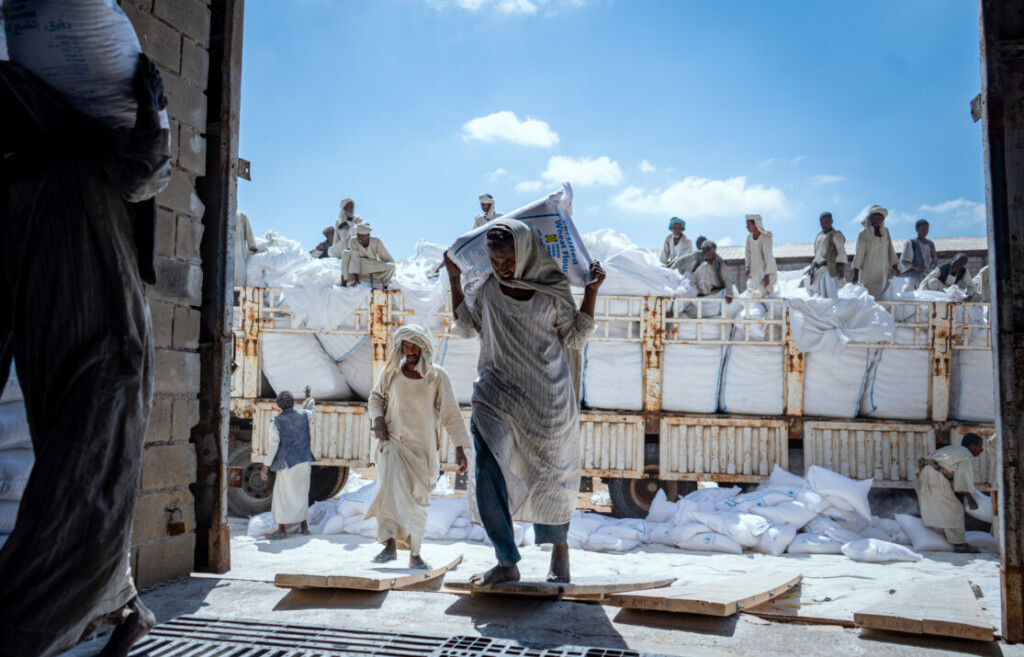
February 28: More than 7,000 tonnes of wheat flour donated by Ukraine to WFP Sudan are offloaded in Port Sudan.
February 29: RSF continued violence against civilians in the Nuba Mountains and El Gezira causes new displacement. Aid to Sudan faces a 40 per cent shipping cost hike due to security concerns in the Red Sea. The UN pledges continued support for Sudan as UNITAMS withdrawal ends. El Burhan holds talks with his Egyptian counterpart in Cairo while Hemedti visits Tripoli. Five Sudanese organisations form an alliance ‘to stop the war by fighting corruption’.
March: Reports about people starving to death in Darfur, Khartoum state, and South Kordofan increase. The USA calls Sudan ‘the largest humanitarian crisis in the world’. The UN chief presents a ‘white paper’ about the humanitarian situation to the Security Council (UNSC). The SLM-AW calls on the UN to officially declare a famine in the region. Aid is withheld in Darfur and Sudan’s acting FA minister opposes the delivery of aid across the border from Chad. The newly appointed US envoy says ‘he hopes’ that talks between the SAF and the RSF will resume in April. Egypt invites Hamdok for talks. After successes against the RSF in Omdurman, the army continues its attacks on the paramilitaries in Khartoum and North Darfur. Hopes of a Ramadan ceasefire fade. A banking expert warns of ‘dollarisation’ of the Sudanese economy. US Intelligence says that Sudan’s prolonged conflict constitutes a threat to regional stability.
March 1: Critics say that the report of the UN High Commissioner for Human Rights on Sudan does not correspond to the scale of violations in the country. SAF-RSF clashes are reported near Wad Madani, capital of El Gezira, and in El Fasher.
March 2: The acting Minister of Foreign Affairs, Ali El Sadig, opposes the delivery of aid to Sudan across the border from Chad. The newly-founded Sudan Youth Network aims to realise a civil democratic transformation in the country.
March 3: Sudanese campaigners call for changes to the country’s legislation on sexual violence.
March 4: The RSF reportedly forces residents to leave Khartoum North. The war has reportedly destroyed 70 per cent of the commercial activities in the country. Sudan and Iran deny talk about an Iranian naval base on the Red Sea coast.
March 5: The USA renews its call for ‘effective measures to end war in Sudan’. El Gezira resistance committees urge the army to stop the RSF atrocities in the state.
March 6: After intensive pressure, the Sudanese government agrees to open borders and airports to humanitarian aid. WFP warns that the ‘Sudan war risks creating the world’s largest hunger crisis’. The UN Panel of Experts latest report highlights ‘atrocity after atrocity’. The Sudan Youth conference in Uganda considers the war ‘an attempt to beat the Sudanese back into submission’.
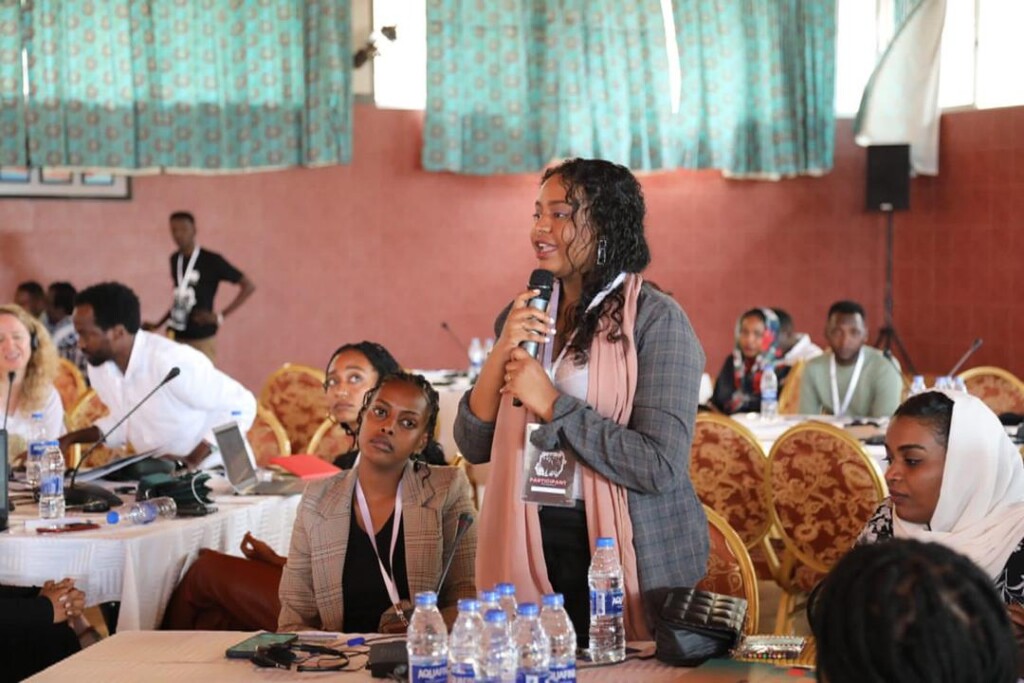
March 7: The Sudanese police releases Egyptian visa forgers.
March 8: The UN Security Council (UNSC) adopts Resolution 2724, urging an immediate halt to hostilities in Sudan. Eastern Sudan’s Kassala denies access to more displaced people. The international community and Sudanese call for aid and a ceasefire ahead of Ramadan. The former governor of Central Darfur, does not rule out that the RSF attacks in El Gezira ‘force civilians to take up arms’.
March 9: Qatar sends 50,000 food baskets to Sudan amid reports of famine in Khartoum. Hopes of a Ramadan ceasefire fade.
March 10: Hamdok visits Cairo after having been invited by the Egyptian government for talks. The RSF welcome UNSC Resolution 2724 while the Sudanese government sets conditions. Several banks reopen branches in Omdurman, after the army regained control of the central parts of the city. Port workers in Red Sea state successfully strike against decisions of the Finance Ministry.
March 11: SAF-RSF battle for El Fasher persists, killing displaced people. Villagers kill four RSF soldiers who raided their homes in West Kordofan. Jurists call on the authorities to be more flexible in dealing with rape cases. The newly appointed US special envoy for Sudan begins touring Africa and the Middle East. US Intelligence cautions that Sudan’s prolonged conflict constitutes a threat to regional stability.
March 12: The SAF takes control of the National Radio and Television Corporation in old Omdurman. El Burhan visits Omdurman, while Hamdok reports from Cairo that Egypt ‘may host talks’.
March 13: Darfuri refugees in Adré in eastern Chad suffer from food and shelter shortages. Save the Children calls for support to prevent 230,000 children and new mothers in Sudan from dying.
Central Darfur tribal leaders refuse to share revenues with the RSF. The National Forces Coordination coalition headed by Malik Agar, vice president of the Sovereignty Council, intends to sign a political accord with the SAF.
March 14: Concerted high-level international pressure is needed to change the calculations of the generals, says former UK Ambassador to Sudan Dame Rosalind Marsden. Cholera, dengue fever, and malaria are spreading further in Sudan. Charity kitchens in Khartoum state are able to resume their activities ‘thanks to huge efforts of volunteers’. Sixty lorries carrying humanitarian aid cross the border from Chad into West Darfur.
March 15: Human Rights Watch says that UN Secretary-General Antonio Guterres plans to send a ‘white paper’ on Sudan to the UNSC. RSF troops continue to plunder villages in El Gezira.
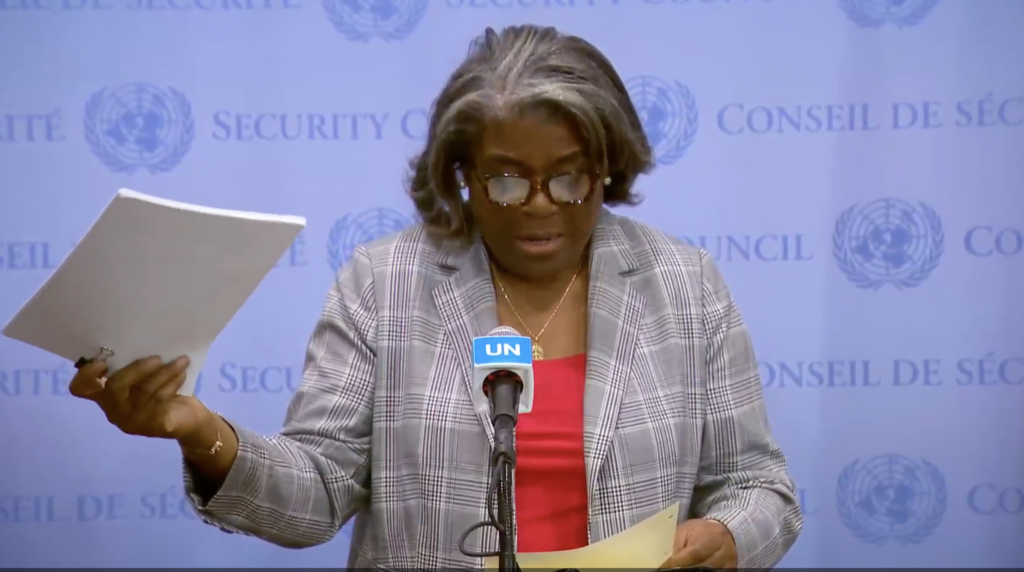
March 16: The SAF resumes its attacks on RSF sites in Khartoum North, as the city and Khartoum remain deprived of communication networks and are short of drinking water. According to a Sudanese military expert, Iranian drones played a decisive role in the SAF battle for Omdurman.
March 17: The SPLM-N El Hilu condemns the killing of two teachers and 12 students in an airstrike on a Nuba village school.
March 18: SAF-RSF battles rage unabated across Sudan. The war in Sudan ‘could affect relations with Chad’. US Envoy Tom Perriello hears Egypt’s stance on the Sudan war. Measles is spreading in the country, rabies is reported in South Kordofan.
March 19: Oil engineers in West Kordofan confirm ‘large-scale sabotage operations’ in the Dafra oil field. The RSF detain tribal leaders in Central Darfur. Japan financially supports the IGAD ‘peacebuilding process’ in Sudan.
March 20: Acknowledging Sudan as ‘the largest humanitarian crisis in the world’, the USA pledges more than $47 million for emergency response in the country, Chad, and South Sudan. Darfur Governor Minni Minawi agrees with the UN to facilitate the transport of humanitarian aid from Port Sudan to Darfur. The Tagadom spokesperson says that a ‘leaked’ proposal to resolve the war has been falsely attributed to the alliance’s chair, Hamdok. The attack on the Sheikh Gariballah Mosque is the latest one on a place of worship in Khartoum state.
March 21: Humanitarian officials brief the UNSC about the ‘catastrophic levels of food insecurity’ in the country. ‘Challenges’ at Chad-Sudan border hamper humanitarian efforts. The US envoy to Sudan hopes that SAF-RSF talks will resume after Ramadan. The Darfur Bar Association (DBA) is preparing a forum in Kalma camp, ahead of a large humanitarian conference in May. The SPLM-N El Hilu warns SAF not to continue targeting civilians in the Nuba Mountains.
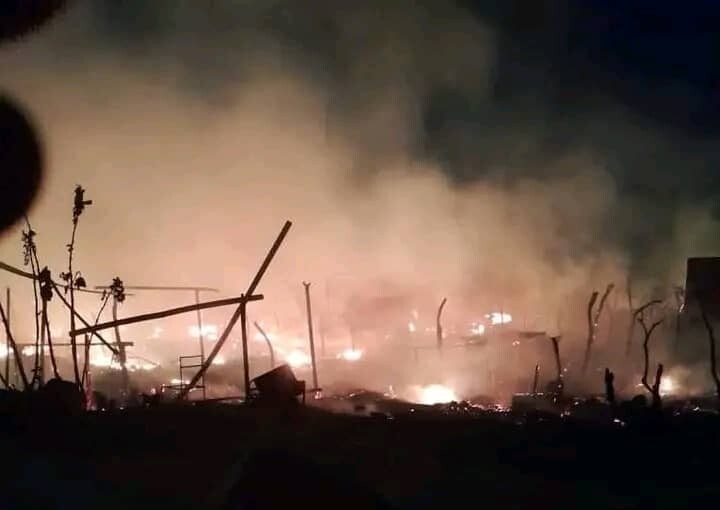
March 22: At least a dozen people are killed in air strikes and shelling in West Kordofan and El Gezira. Sudanese rights groups deliver reports about enforced disappearances to the UN High Commissioner for Human Rights in Geneva.
March 24: The large Kalma camp near Nyala, capital of South Darfur, reports a surge in deaths due to severe malnutrition. Combatants of the SLM faction headed by Minni Minawi will fight alongside the SAF in Khartoum state. The RSF forms a native administration system in El Gezira.
March 25: Nine people are killed in an air raid by the Sudanese Air Force on El Fasher. Kutum town is also bombed. Sudanese refugees in Uganda and in Darfur suffer from a severe drinking water crisis.
March 26: At the DBA forum in Kalma camp, the SLM-AW urges the UN to declare a famine in the region. IGAD appoints a South Sudanese diplomat as special envoy for Sudan. The El Gezira resistance committees accuse the RSF of killing 43 people in the first week of Ramadan.
March 27: UK parliamentarians call for an ‘immediate ceasefire in Sudan and an end to the UAE funding of the RSF. The RSF denies the accusations of the El Gezira resistance committees. According to Lt Gen Shamseldin Kabbashi, SAF deputy commander-in-chief, the popular resistance groups fighting the RSF need better control. UK parliamentarians.
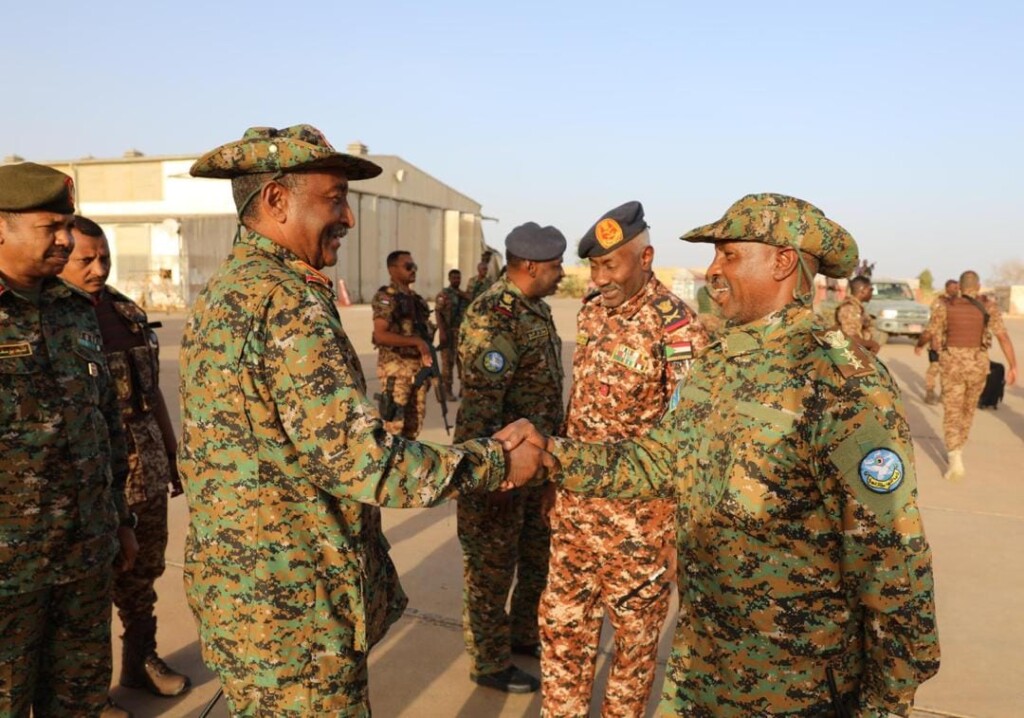
March 28: Rebel forces of Minni Minawi clash with RSF soldiers in Omdurman.
March 29: Aid is withheld in Sudan while 37 per cent of the population face severe hunger. Three people die in new attacks by the Sudanese Air Force on neighbourhoods in El Fasher, as the RSF attacks an SLM-AW convoy near the city. A banking expert warns of ‘dollarisation’ of the Sudanese economy.
March 30: The National Committee for War Crimes and Violations by the Rapid Support Forces (RSF) files criminal charges with the Port Sudan Prosecution Office in the Red Sea state against 17 leaders of the Tagadom Coordination Committee.
March 31: Displaced in the Kendebbe camp in West Darfur report the spread of ‘an unknown disease’.
Previous timelines
Sudan timeline October-December 2023: War deepens Sudan’s suffering
Sudan timeline July-September 2023: Sudanese ‘in survival mode’
Sudan timeline April-June 2020: Covid-19 marks all aspects of life, inflation soars
Sudan timeline January-March 2020: Little relief to the country’s economic, security woes
Sudan timeline October-December 2019: Interim government put to the test
Sudan timeline July-September 2019: Turbulent transformation from tyranny











 and then
and then